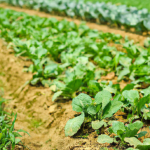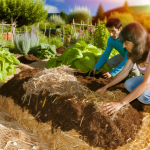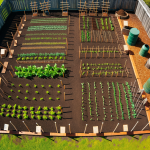Are you looking to maximize the yield, try Companion Planting with Fruit Trees? By strategically selecting plants that complement your fruit trees, you can create a harmonious garden that not only increases the productivity of your fruit trees but also supports overall ecosystem health.
Companion planting is an age-old technique that involves pairing plants based on their mutually beneficial characteristics. When it comes to fruit trees, certain companion plants can act as natural pest repellents, attract beneficial insects, and improve soil fertility. This holistic approach to gardening not only helps in reducing the need for chemical interventions but also promotes a more sustainable and thriving garden ecosystem.
Incorporating companion plants such as marigolds, lavender, and chives can help deter pests like aphids, while plants like clover and vetch can fix nitrogen in the soil, enhancing the overall nutrient availability for your fruit trees. With the right combination of companion plants, you can create a well-balanced and productive fruit tree garden.
Unlock the potential of your fruit trees by mastering the art of companion planting – it’s a game-changer for any gardener seeking to optimize their yield and promote a healthy, vibrant garden ecosystem.
Benefits of companion planting with fruit trees
Companion planting offers numerous benefits for fruit trees. One of the primary advantages is pest control. By incorporating specific companion plants, you can naturally repel pests that may harm your fruit trees. For example, marigolds are known to deter aphids, nematodes, and other pests that commonly affect fruit trees. Planting marigolds around your fruit trees can create a protective barrier, reducing the need for chemical pesticides.
Another benefit of companion planting with fruit trees is attracting beneficial insects. Some companion plants, such as lavender and chives, have flowers that attract pollinators like bees and butterflies. These pollinators play a crucial role in the fruit tree’s reproductive process, ensuring a healthy yield. By including these companion plants in your garden, you can increase the pollination rate and ultimately enhance the productivity of your fruit trees.
Additionally, companion plants can improve soil health and fertility. Certain plants, like clover and vetch, have the ability to fix nitrogen in the soil. Nitrogen is an essential nutrient for plant growth, and by planting nitrogen-fixing companion plants near your fruit trees, you can increase the availability of this vital element. Improved soil fertility leads to healthier trees, stronger root systems, and ultimately, higher fruit yields.
Understanding the science behind companion planting
Companion planting with fruit trees may seem like a gardening folklore, but there is scientific evidence to support its effectiveness. Plants release various compounds into the air and soil, and these compounds can have positive or negative effects on neighboring plants. Some companion plants emit chemicals that repel pests, while others release volatile compounds that attract beneficial insects.
In addition to chemical interactions, companion plants can also affect soil conditions. For example, legumes like clover and vetch have the ability to fix nitrogen through a symbiotic relationship with nitrogen-fixing bacteria. This process enriches the soil with nitrogen, a vital nutrient for plant growth. By understanding the science behind companion planting, you can make informed choices when selecting companion plants for your fruit trees.
Choosing the right companion plants for fruit trees
Selecting the right companion plants is crucial for the success of your fruit tree garden. When choosing companion plants, consider their compatibility with your fruit trees in terms of sunlight, soil type, and water requirements. Additionally, take into account the specific benefits each companion plant offers, such as pest deterrence, pollinator attraction, or soil improvement.
Marigolds are popular companion plants for fruit trees due to their pest-repellent properties. Planting marigolds around your fruit trees can help deter pests like aphids, whiteflies, and nematodes. Their strong fragrance acts as a natural repellent, making your fruit trees less susceptible to infestations.
Lavender and chives are other excellent choices for companion planting. These plants produce beautiful flowers that attract pollinators, ensuring proper pollination of your fruit trees. Bees and butterflies are crucial for fruit set and development, so attracting them to your garden will significantly improve the yield of your fruit trees.
Companion plants that deter pests and diseases
Companion plants play a vital role in deterring pests and diseases that can negatively impact your fruit trees. By strategically planting certain companion plants, you can create an environment that is less inviting to common fruit tree pests.
Nasturtiums are an excellent option for pest control. These vibrant flowers attract pests like aphids, acting as a trap crop. Aphids are drawn to the nasturtiums, diverting their attention away from your fruit trees. Regularly inspect the nasturtium leaves and remove any aphids to prevent them from migrating to your fruit trees.
Another effective companion plant for deterring pests is garlic. The strong smell of garlic repels a wide range of pests, including aphids, caterpillars, and spider mites. Planting garlic around your fruit trees can create a protective barrier against these pests, reducing the need for chemical intervention.
Companion plants that attract beneficial insects
Attracting beneficial insects to your fruit tree garden is essential for pollination and pest control. Certain companion plants have flowers that act as beacons for beneficial insects, helping to create a balanced ecosystem that supports the health of your fruit trees.
Borage is a popular companion plant known for its vibrant blue flowers. These flowers attract bees, which are vital for pollinating fruit trees. By planting borage near your fruit trees, you can significantly increase the pollination rate, leading to a higher fruit yield.
Dill is another beneficial companion plant that attracts beneficial insects such as ladybugs and lacewings. These insects feed on pests like aphids and mites, helping to keep your fruit trees free from infestations. Planting dill in close proximity to your fruit trees can provide a natural defense against harmful insects.
Companion plants that improve soil health and fertility

Maintaining healthy soil is essential for the long-term success of your fruit trees. Certain companion plants have the ability to improve soil health and fertility, providing your fruit trees with the necessary nutrients for optimal growth.
Clover is a nitrogen-fixing plant that can significantly enhance the fertility of your soil. Nitrogen is an essential nutrient for plant growth, and by planting clover near your fruit trees, you can increase the availability of nitrogen in the soil. This nutrient enrichment promotes healthy tree growth and improves the overall yield.
Vetch is another nitrogen-fixing companion plant that can improve soil fertility. Similar to clover, vetch forms a symbiotic relationship with nitrogen-fixing bacteria, allowing it to convert atmospheric nitrogen into a usable form for plants. Planting vetch in your fruit tree garden can help maintain a healthy nitrogen balance, ensuring robust tree growth.
Arranging companion plants in your fruit tree garden
When arranging companion plants in your fruit tree garden, consider the space requirements and growth habits of each plant. Place taller companion plants towards the back of the garden, ensuring they do not shade or compete with your fruit trees for sunlight. Smaller companion plants can be placed in front, creating a visually appealing and functional garden design.
Additionally, consider the specific needs of each companion plant. Some plants may require more water or different soil conditions than fruit trees. Grouping companion plants with similar water and soil requirements together can simplify maintenance and ensure optimal growing conditions for both the fruit trees and their companions.
Common mistakes to avoid in companion planting
While companion planting with fruit trees offers numerous benefits, there are a few common mistakes to avoid. One of the most common mistakes is overcrowding. It’s important to give both your fruit trees and their companion plants enough space to grow and thrive. Overcrowding can lead to competition for resources, stunted growth, and increased susceptibility to pests and diseases.
Another mistake to avoid is failing to rotate companion plants with fruit trees. Planting the same companion plants in the same location year after year can deplete the soil of specific nutrients and increase the risk of pest and disease buildup. Rotate companion plants annually to maintain soil fertility and minimize potential issues.
Maximizing your yield companion planting with fruit trees
Incorporating companion plants into your fruit tree garden is a game-changer for any gardener seeking to optimize their yield and promote a healthy, vibrant garden ecosystem. The benefits of companion planting, such as pest control, pollinator attraction, and soil improvement, are invaluable for fruit tree health and productivity.
By understanding the science behind companion planting with fruit trees and selecting the right companion plants, you can create a well-balanced and productive fruit tree garden. Remember to arrange companion plants strategically, considering their space requirements and growth habits. Avoid common mistakes like overcrowding and failing to rotate companion plants to ensure long-term success.
Unlock the potential of your fruit trees by mastering the art of companion planting with fruit trees. Your efforts will not only result in bountiful harvests but also contribute to a more sustainable and thriving garden ecosystem. Start companion planting today and watch your fruit trees flourish like never before. Check out our article Farming versus gardening.











Your point of view caught my eye and was very interesting. Thanks. I have a question for you.